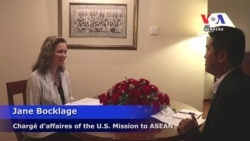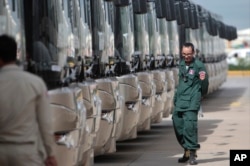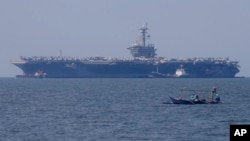Editor’s Note: The United States and ASEAN recently celebrated its 40 years of a partnership in which they have built economic engagement, security, the rule of law, sustainable development and people-to-people relations. But in recent years the region has seen the growing influence of China in trade and development. At the same time, ASEAN nations traditionally allied with the United States and professing democratic principles have shied away from their commitment to promoting democracy and human rights. Jane Bocklage, chargé d'affaires of the U.S. Mission to ASEAN in Jakarta, spoke to VOA Khmer reporters Aun Chhengpor and Sun Narin during a recent visit to Cambodia to preside over the Young Southeast Asian Leadership Initiative’s STEM Education Workshop.
VOA: In general, where does the relationship between the U.S. and ASEAN stand now?
Bocklage: Absolutely, we’ve started this relationship as you said more than 40 years ago. And it has grown dramatically in that time. It is a strong, growing, striving, and deepening relationship. About seven years ago, we opened the US mission to ASEAN in Jakarta. We were the first dialogue partner with the resident ambassador in Jakarta. That was one of the first steps to show the depth of our commitment to ASEAN and the region as a whole. And then moving forward in 2015, we established the strategic partnership and we now have the strategic plan of action that guides our relationship going forward. So we see the relationship as hugely positive. The United States and ASEAN both have benefited diplomatically, and economically, from a national security perspective and from people-to-people relations. So we are very positive and looking forward to an even deeper relationship going forward.
VOA: Cambodian Prime Minister Hun Sen has stressed the ASEAN principle of consensus. What do you think about that?
Bocklage: We think ASEAN consensus is important to the organization. It is up to ASEAN to decide how to organize itself, lets say that to begin with. ASEAN has decided on the consensus principle. We respect that. That is ASEAN’s choice. Obviously, we see challenges. But we understand from working with ASEAN that the ASEAN countries very much view the consensus principle as what has helped them stay together for the last 50 plus years. And so if that is the guiding principle that ASEAN has chosen for its organization, then we also support that.
VOA: Do you think it is an obstacle for ASEAN agreement on certain issues?
Bocklage: Of course! But I would suggest in any family of ten that disagreements are going to happen, and that if one member of the family is disagreeing or two members of the family are disagreeing about how things go forwards – well, obviously it’s challenge the organization. As the organization tackles issues that are important, and difficult and complex, there will naturally be disagreements among the ten. But consensus is important to ASEAN and so we’re supporting the organization as it goes forwards.
VOA: What are the challenges posed by China’s growing influence to US-ASEAN relations?
Bocklage: China is a natural partner of many countries in ASEAN. There is an economic relationship. There is a history there and that is as it should be. We are not in competition with China for ASEAN’s love, if you will. This is a striving, growing, developing region. All of us have a stake in it. So we don’t see China’s influence or China’s growth as necessarily a negative. We have some disagreements with China. That is natural. But we don’t have significant objection to China having a relationship with ASEAN. That is not what it is about. ASEAN countries all have their own relationship with China. Our role is not to dictate to ASEAN countries what the relations with China are. We think there is a room for both of us.
VOA: Many ASEAN countries have been criticized lately for backtracking when it comes to democratic principles and human rights. What is the US reaction to this?
Bocklage: So a couple of thoughts on that. First of all, we’ve been with the Pacific nations for a hundred years. The United States understands that the region evolves, and that we will see progress and we will see steps backwards. We are still in it to be a partner with ASEAN. We are not going anywhere. So we are committed to the region and committed to helping Southeast Asia progress and develop and move forwards. In terms of each individual country, those are the things we tackle on the bilateral basis. I would say that the United States’ stance on democratic values is well-known. We will always promote the values that we feel strongly about.
VOA: What is the vision of President Trump’s administration towards Southeast Asia?
Bocklage: So you have probably heard quite a bit about the Indo-Pacific strategy. You heard a lot of people talk about what that might be. The United States is very interested in engaging across the region. Looking at the Asia-Pacific, president Trump and his administration has taken a more extensive view than we had in the past and wants to include some of our Southeast Asian partners in that conversation. I would defer to Washington on what are President Trump’s views on Southeast Asia and how that is coming about. But I will say that we have seen no significant changes in how important the region is as a whole, and no significant changes in the importance of ASEAN at its center.
VOA: The major Indo-Pacific nations -- the US, Japan, Australia and India -- are said to be planning a major infrastructure initiative similar in scope to China’s Belt and Road Initiative. What might this look like?
Bocklage: So a couple of things that were buried in that question. One is the issue of the four countries: Australia, Japan, India, and ourselves. We have partnership with all of those countries. We meet with them. We discuss with them but in no way does this mean to be a four-country-led effort that leaves others behind or excludes anyone. It’s one way that we engage with our partners. So we talk to the four, we talk to the three, we talk to ASEAN, we talk with China, and we meet a variety of constructs to discuss how to best tackle our shared challenges in the region. In terms of an alternative to China, one of the things that we see when we look at Southeast Asia and that we have been told by our ASEAN partners is that infrastructure as a priority. And there is sufficient work to do on infrastructure, and connectivity, in Southeast Asia that we don’t have to be an alternative to China. We can share the region with China and others who are interested.
VOA: The USS Carl Vinson recently visited the South China Sea, where China has constructed numerous military bases and other installations in disputed territory. Do these moves pose a strategic challenge to the security order in the region?
Bocklage: So I think the United States’ position is quite well-known on this. We do not take the side of any of the claimants. The claims on the South China Sea are the claimants’ disputes among themselves within the adherence to international law. With regards to aircraft carriers, our military conduct operations under international law within those confines across the region and throughout the South China Sea up and down from Singapore, Japan, Korea on a regular basis. The United States thinks it is vitally important to keep the sea open and free where international law allows and respect claims as long as under the U.N. Convention on the Law of the Sea. So we do that in a number of regions around the world and all over, not just in the South China Sea.
VOA: The Trump Administration has been perceived by many as inward-looking when it comes to trade, demanding fair trade over free trade, exemplified by the withdrawal from the Trans-Pacific Partnership. How does this affect the U.S. engagement with ASEAN?
Bocklage: So I think in economic engagement it certainly affects our relations with ASEAN. I would paint it in a more positive light. We have an immense amount of economic engagement with ASEAN on a variety of fronts. We’ve talked just a bit ago about the U.S. investment in a region, as well as things that we are working with ASEAN on, such as ASEAN Single Window, regulatory environment, statue-economy, energy policy, innovation and entrepreneurship. There is a whole-hose of economic engagement that goes well beyond the trade aspect of the relationship. In terms of trade, on specific trade policy from the United States that is the per-view of our U.S. trade representative colleagues and I would not speak out of turn. But the United States is definitely exploring ways to continue our already-strong trade relationship with region.












